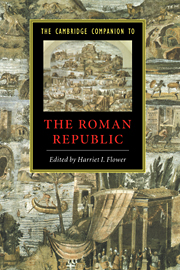Book contents
- Frontmatter
- Introduction
- PART 1 POLITICAL AND MILITARY HISTORY
- PART 2 ROMAN SOCIETY
- PART 3 ROME'S EMPIRE
- PART 4 ROMAN CULTURE
- 12 Literature in the Roman Republic
- 13 Roman Art during the Republic
- 14 Spectacle and Political Culture in the Roman Republic
- PART 5 EPILOGUE: THE INFLUENCE OF THE ROMAN REPUBLIC
- Timeline
- Bibliography
- Index
12 - Literature in the Roman Republic
from PART 4 - ROMAN CULTURE
Published online by Cambridge University Press: 28 May 2006
- Frontmatter
- Introduction
- PART 1 POLITICAL AND MILITARY HISTORY
- PART 2 ROMAN SOCIETY
- PART 3 ROME'S EMPIRE
- PART 4 ROMAN CULTURE
- 12 Literature in the Roman Republic
- 13 Roman Art during the Republic
- 14 Spectacle and Political Culture in the Roman Republic
- PART 5 EPILOGUE: THE INFLUENCE OF THE ROMAN REPUBLIC
- Timeline
- Bibliography
- Index
Summary
By the chronology of Varro, the greatest scholar of the Ciceronian and Augustan age, Rome's republic was 250 years old, and the city itself over 500, before the first literary event in its history. Until the third century, Romans seem to have used stylized language only for the formulae of religion and the law, and literacy was probably limited to the tiny elite who provided the city's priests, legal experts, and politicians. Thus, when literature was publicly welcomed at Rome, it was in a form that had been transferred from Greek culture by a Greek from South Italy; there was drama, which could be performed for a largely illiterate audience, and epic, which could be recited to them.
Despite this delayed flowering, drama and epic developed rapidly at Rome. And before the Republic degenerated into autocracy, poetry, oratory, and expository prose reached a level of achievement equal to the acknowledged greatness of Augustan literature. By 35 B.C. Romans not only heard but also read Latin prose and verse in virtually every genre except the novel; all other literary forms were already represented in the society in which Virgil and Horace, the oldest major poets of the principate, became adult.
- Type
- Chapter
- Information
- The Cambridge Companion to the Roman Republic , pp. 271 - 293Publisher: Cambridge University PressPrint publication year: 2004

